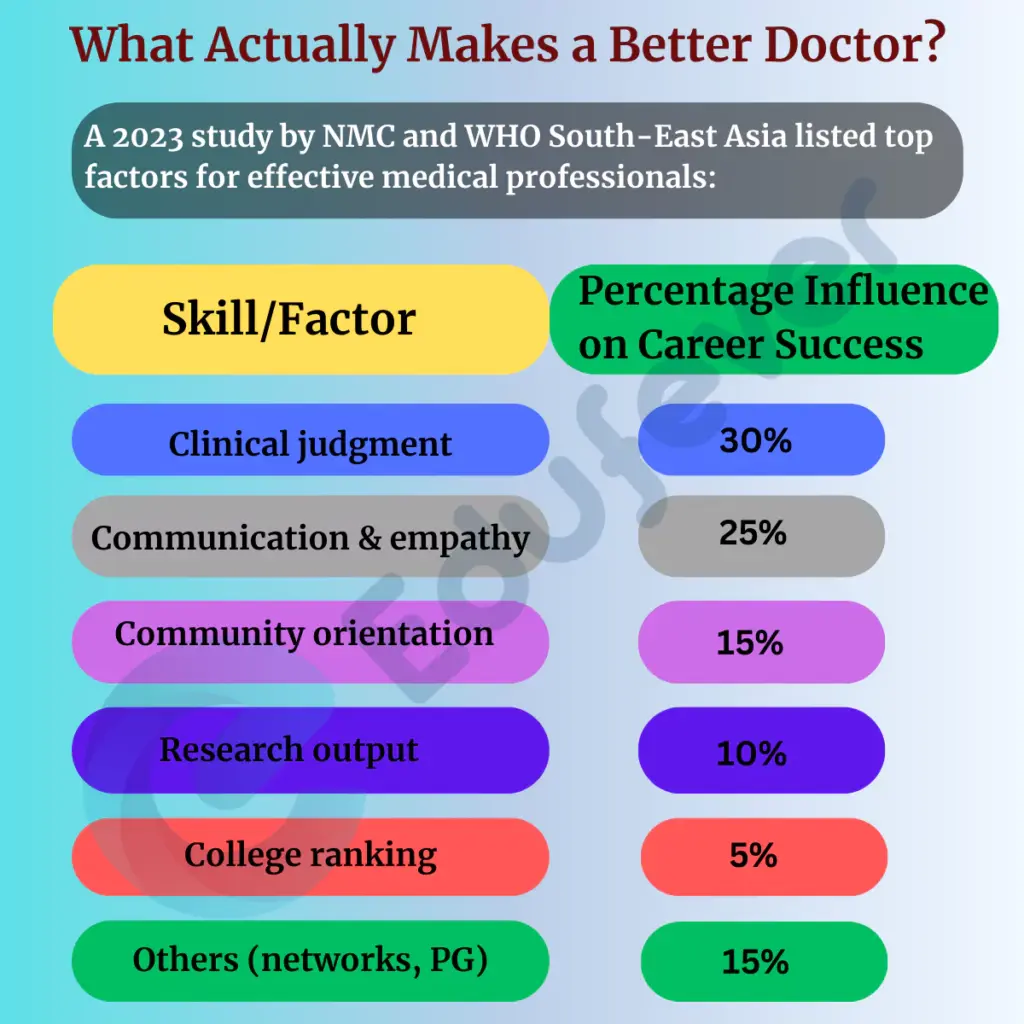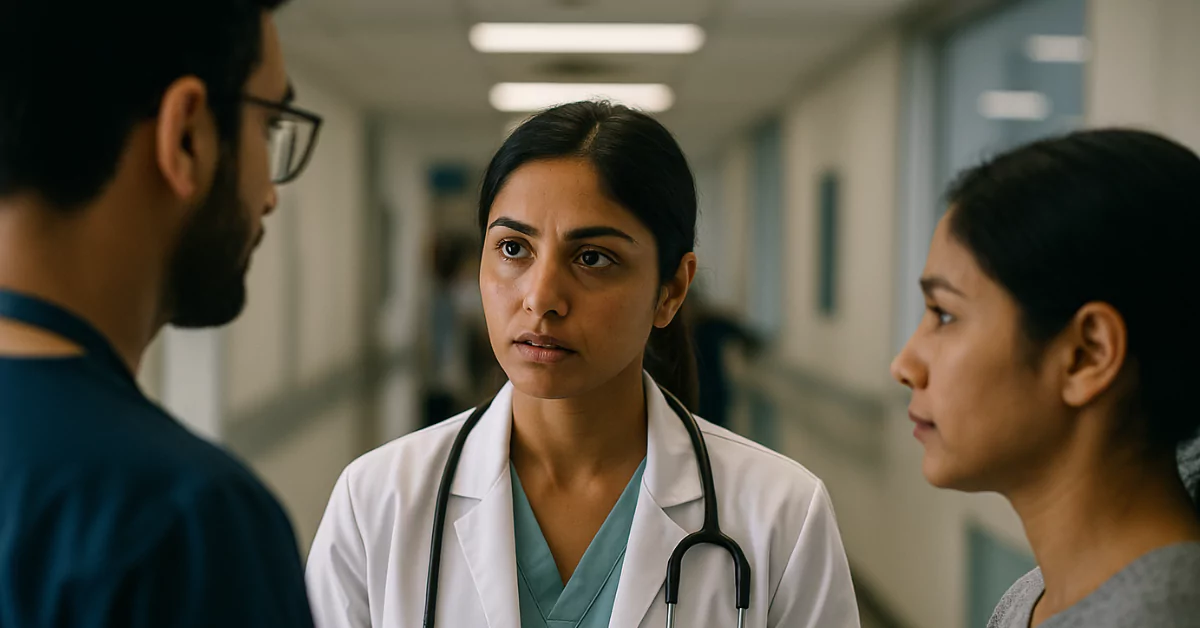MBBS in India: Each year, over 20 lakh students appear for NEET UG, chasing the dream of becoming doctors. The common perception? That a top NEET rank equals admission to AIIMS or other premier government colleges — and by extension, a successful medical career.
But is this always true? Does cracking AIIMS ensure you become a better doctor than someone studying in a mid-tier government or private college?
“A top NEET rank can help you enter a good college, but it does not guarantee that you’ll become a great doctor.”
Let’s break the myth and look deeper into what truly shapes a medical professional in India.

The AIIMS Tag: Prestige, Pressure & Opportunity
What AIIMS Offers:
- World-class infrastructure
- Research-oriented faculty
- International exposure
- Selective peer group
AIIMS Delhi, for example, offers a robust curriculum, early clinical exposure, and access to super-speciality departments that help develop critical thinking and diagnostic skills.
The negative side:
- Extreme pressure
- Competitive burnout
- Limited personalised mentorship due to peer excellence
AIIMS May Shape Minds, But Rural Clinics Build Hearts
Yes, AIIMS offers unmatched academic training. But India needs doctors who are not just brilliant — but available, accessible, and empathetic.
Life at Mid-Tier Government Colleges
Examples: Medical College Kolkata, BJMC Pune, KGMU Lucknow
These colleges offer:
- Solid clinical exposure, often through a high patient load
- Affordable education
- Decent faculty-student ratio in most departments
Challenges include:
- Outdated infrastructure
- Inconsistent faculty quality
- Fewer research opportunities
Example:
- GMC Nagpur treats 18,000+ OPD patients/month (compared to ~7,000 in AIIMS Bhopal).
- MUHS Report 2024: Only 2 of 25 government colleges in Maharashtra have 100% faculty capacity.
Yet, many doctors from these colleges excel by building grit, managing large OPDs, and learning practical medicine hands-on.
The Private Medical College Experience: Paywall or Pathway?
Examples: Manipal, SRM, DY Patil, KMC Mangalore
Private colleges vary greatly:
- Some offer excellent infrastructure, better faculty-student ratios
- State-of-the-art simulation labs
- Better amenities and discipline
Limitations:
- Higher fees (₹60 lakhs–₹1 crore+)
- Inconsistent clinical exposure (especially in new or rural colleges)
- Peer groups may lack diversity in academic excellence
Yet, many private-college students become successful through:
- Dedicated self-study
- External coaching for PG
- Overseas opportunities (PLAB, USMLE)
Do Better Colleges = Better Doctors?
| Parameter | AIIMS Delhi | Mid-tier Govt College | Private College |
| Clinical Exposure | High (super-speciality) | Very High (general cases) | Varies (low in some) |
| Research Opportunities | Extensive | Moderate | Selective |
| Cost of Education | Minimal | Low | Very High |
| Competition Level | Extreme | High | Moderate |
| Focus on PG Preparation | Limited (AIIMS UG is research-heavy) | Moderate | High (coaching-integrated) |
| Doctor Output Quality | Excellent but niche | Highly practical | Mixed but improving |
Qualities Needed for a Good Doctor
- Empathy & Communication: Must needed qualities for a doctor.
- Clinical Skills: Best learned in high-patient-load hospitals, not simulation labs alone.
- Lifelong Learning: Needed in AIIMS as much as in any rural private college.
- Exposure to Rural Healthcare: Often ignored by urban-centric top colleges.
- Post-MBBS Focus: NEET PG, USMLE, or UPSC, all require self-drive beyond college brand.
Alumni Success is Spread Across Tiers
- AIIMS alumni often take international routes or become clinician-scientists.
- Mid-tier colleges have produced top-ranked civil servants, surgeons, and specialists.
- Private college alumni are increasingly clearing INI-CET, NEET PG, PLAB, and working in top hospitals.
Brand may open the first door, but success is built post-MBBS.
Rank is a Tool, Not a Guarantee
Cracking NEET and getting into a top-tier college is an achievement. But to become a great doctor you need:
- Consistent hard work
- Patient exposure
- Clinical judgment
- Real-world experience
- Empathy for patients
- PG success and clinical performance
- Empathy and ethics
Don’t chase just the rank. Chase the doctor you want to become.
So no, top NEET colleges don’t guarantee better doctors. They offer better exposure, but what you do with that exposure is what ultimately defines your journey in medicine.
Parents and students should focus less on reputation and more on fit: Which college suits with your learning style, values, and long-term goals?

